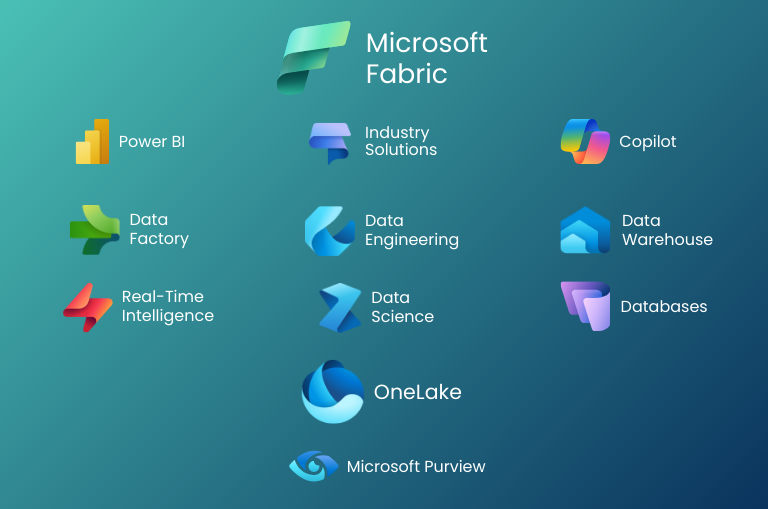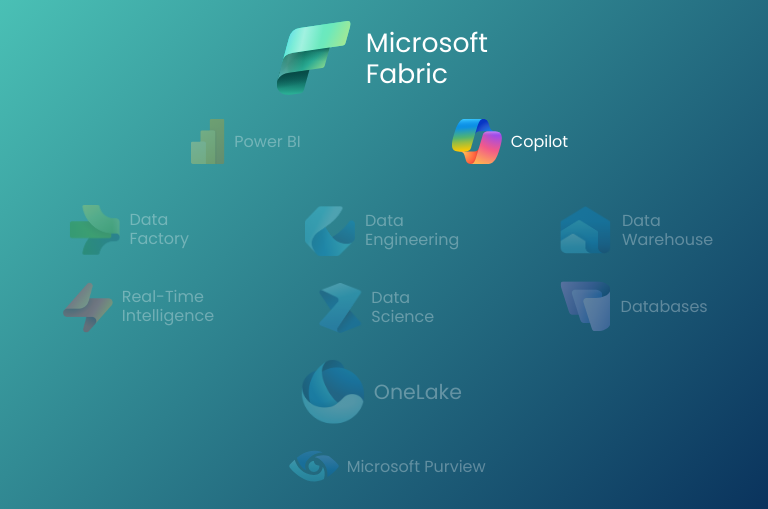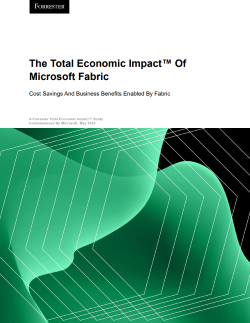What is Copilot in Microsoft Fabric
- 12 min read
Do you want to outpace the competition and make decisions based on facts rather than intuition? The combination of Microsoft Fabric and Microsoft 365 Copilot, enhanced by Microsoft Power BI technology, is the key to unlocking the full potential of your data.
Imagine vast sets of information transforming into clear, strategic insights available to every employee.
With advanced tools, Copilot supports both specialists and users without deep technical knowledge, enabling effective use of data. AI transformation not only streamlines processes but also opens new opportunities in analysis and decision-making, leading to better business results.
What is Microsoft Fabric?
Microsoft Fabric is a comprehensive, integrated data and analytics platform created for enterprises seeking a simple yet versatile solution for collecting, processing, and analysing information. The platform operates in a SaaS (Software as a Service) model, ensuring ease of use, high scalability, and security.
A key assumption of the platform is the unification of resources and services within one consistent environment. Instead of integrating solutions from various vendors, Microsoft Fabric offers a unified technology stack based on Microsoft Azure cloud, streamlining work for both business teams and IT specialists.
Data in Microsoft Fabric is stored in OneLake, a central repository that eliminates the need to use multiple, often dispersed, data stores. This allows companies to manage access more efficiently, maintain data consistency, and ensure compliance with regulations.
Built-in artificial intelligence (AI) mechanisms help better understand data and use it in Microsoft Azure AI Services and specific applications, from real-time reporting to advanced machine learning modelling available in Microsoft Azure AI Foundry.
One of the most innovative elements of the platform is Microsoft 365 Copilot, an integral part of Fabric. Copilot is an assistant based on generative artificial intelligence (GenAI) that automates routine tasks, fills gaps in expertise, and suggests optimal operations on data. As a result, users can quickly create reports, formulate queries, and implement data engineering processes without writing complex scripts.
What is more, Copilot analyses data context and adjusts suggestions to specific business needs. As a result, organisations using Microsoft Fabric, supported by Microsoft Copilot, gain an integrated environment for seamlessly combining data from diverse sources such as Microsoft Dynamics 365 Sales, designing advanced analytical pipelines, and leveraging machine learning algorithms as well as ready large (LLM) and small models (SLM) in daily work.
This consistent platform significantly reduces administrative costs, accelerates the implementation of new projects in Power Platform and Microsoft Copilot Studio, and effectively supports teams at every level in maximising the potential of information.
What applications are included in Microsoft Fabric?
Microsoft Fabric is a suite of services with broad applications across the entire data processing and analysis cycle. It offers a unified platform where each component plays a key role in the ecosystem.

This provides companies with versatile tools for migration, management, and analysis of data, as well as for creating innovative AI solutions.
- Fabric Data Factory - This is a modern tool for integrating and preparing data from various sources. It allows the automation of ETL/ELT processes, task scheduling, and fast transfer of even gigantic volumes of information to target data warehouses. In addition to a rich library of connectors, Data Factory provides mechanisms functional in AI transformation, such as built-in support for intelligent data flows. Thanks to its simple interface, both experienced programmers and business specialists can quickly create data pipelines without the need to write complicated scripts.
- Fabric Data Engineering - A module created for teams specialising in advanced calculations and data engineering. It offers a Spark cluster-based environment, enabling fast processing of massive datasets and integration with other Fabric components. This fosters the creation of scalable machine learning projects, supported by configurable tools and libraries.
- Fabric Data Warehouse - A high-performance data warehouse designed with scalability and flexibility in mind. It allows the separation of computing resources from storage, enabling users to manage performance and costs independently. It supports the native Delta Lake format and integrates seamlessly with other services.
- Fabric Databases - Facilitate the management of relational and custom data structures in a centralised environment. They allow quick replication of data from various sources and consistent scaling for transactional and analytical applications.
- Fabric Data Science - A module that simplifies the design, training, and deployment of machine learning models. It supports integration with Azure Machine Learning and provides a set of tools that facilitate experiments and model lifecycle management.
- Fabric Real-time Intelligence - Provides instant collection and processing of streaming data, enabling real-time event monitoring and log analysis. This allows companies to respond quickly to dynamically changing business conditions based on current data.
- Fabric Power BI - A well-known and valued tool for visualisation and interactive data analysis. In the Fabric environment, it provides easy access to all resources in OneLake, speeding up the creation of reports and dashboards.
- Copilot in Fabric - Copilot is an AI assistant that supports users in automating tasks related to data transformation, cleaning, and modelling. Its ability to generate suggestions and code significantly accelerates the implementation of new analytical processes and learning how to use the platform.
- Fabric OneLake - A central data repository where all files and tables are collected. Thanks to consistent storage, information can be easily shared across different Fabric moduless and data duplication can be avoided.
- Microsoft Purview - A comprehensive solution for data governance and security. It allows monitoring the flow of information within Fabric and establishing governance and compliance policies.
- Fabric Industry Solutions - Provides dedicated industry-specific data solutions that form a solid foundation for data management, analysis, and key decision-making. These solutions address the specific challenges of different sectors, enabling companies to optimise processes, combine data from many sources, and use advanced analytical tools.
Microsoft Fabric combines all these areas into a unified data platform, offering the most versatile platform for big data analytics across the industry. Fabric enables organisations and individuals to transform large and complex data repositories into practical working solutions and business analyses.
The future of AI assistants and their collaboration with unified data platforms
AI assistants and agents such as Microsoft 365 Copilot, Google Gemini, Amazon Q, and ChatGPT are revolutionising the way companies work and interact with data. However, these advanced tools require a powerful data foundation to operate effectively and deliver precise responses.
Cloud AI assistants and unified data platforms create a symbiotic relationship. Every generative AI challenge is essentially a data challenge. AI assistants need access to high-quality, structured data to provide accurate answers and recommendations. In turn, unified data platforms like Microsoft Fabric gain value through conversational interfaces that democratize access to data analytics.
- The global cloud AI solutions market was valued at 87.27 billion dollars in 2024, with projected CAGR growth of 39.7% in 2025–2030.
- In 2025, as many as 85% of enterprises will use artificial intelligence agents in their business operations.
- By 2026, more than one-third of enterprises will implement cloud AI and data platforms in their information architectures.
- The AI agents market value is expected to grow to 150 billion dollars in 2025, compared to 3.7 billion dollars in 2023.
- By the end of 2025, around 97 million people will be working in the AI space, meeting the industry’s growing demand.
Integration of these systems enables:
- Access organisational data (Microsoft Copilot uses Microsoft Graph)
- Elimination of data silos and streamlining of analytical processes
- Increased operational efficiency through automation and prediction
- Scaling AI solutions without building your own infrastructure
The future belongs to organisations that effectively combine the capabilities of AI assistants with unified data platforms, creating ecosystems that support data-driven decision-making.
What is Copilot in Fabric
Microsoft Copilot in Microsoft Fabric is an intelligent assistant based on artificial intelligence that supports users in data analysis, report creation, and automation of analytical tasks.

By integrating advanced LLM models, Copilot offers features such as:
- Intelligent code completion: Helps developers and analysts create scripts and SQL queries faster, adapting to the work context.
- Automation of routine tasks: Simplifies data processing, report preparation, and information transformation without manual intervention.
- Generating visualisations and reports: Based on input data, Copilot creates clear charts and reports, making it easier to understand key business metrics.
- Natural Language Processing (NLP): Enables asking questions in natural language, which are automatically translated into data queries, making analysis more intuitive.
- Collaboration with other modules: Copilot integrates with various Microsoft Fabric components, such as Data Factory, Power BI, or Real-Time Intelligence, ensuring a seamless user experience.
With these functionalities, Copilot in Microsoft Fabric not only streamlines analytical processes but also enables users to quickly transform raw data into valuable insights, which is crucial for making strategic business decisions.
Who is Copilot in Fabric for?
M365 Copilot in Microsoft Fabric is designed both for data professionals and for business users without advanced technical knowledge. Thanks to its intuitive interface and automated features, this tool is ideal for:
- Data analysts: Simplifies the analysis of large datasets and the creation of advanced reports.
- IT departments: Automates daily tasks related to data management and infrastructure maintenance.
- Managers and decision-makers: Provides clear visualisations and reports that support strategic decision-making.
- Business users: Enables independent use of analytical tools without engaging technical teams.
Thanks to its tailored features, Copilot in Fabric makes data analysis more accessible and effective for a wide spectrum of users within an organisation.
How to use Copilot in Fabric in business?
To fully leverage the capabilities of Copilot in Microsoft Fabric in business, it is worth:
- Automating reporting: Use Copilot to generate regular reports, saving time and reducing errors.
- Optimising analytical processes: Take advantage of Copilot’s intelligent suggestions to improve existing data analysis processes.
- Creating dynamic visualisations: Use tools to create interactive charts and dashboards that simplify data understanding.
- Integration with other systems: Connect Copilot with other Microsoft Fabric modules such as Power BI or Data Factory for a consistent and comprehensive solution.
What are the benefits of using Copilot in Fabric?
Using Copilot in Microsoft Fabric brings many benefits, including:
- Increased efficiency: Automation of routine tasks saves time and allows focus on strategic activities.
- Better accuracy of analyses: Intelligent suggestions and automation reduce the risk of errors in data analysis.
- Faster decision-making: With quick access to clear reports and visualisations, decisions can be made faster and based on more accurate information.
- Support for different roles: The tool is tailored to the needs of various users, from analysts to managers.
What are the benefits of using Copilot in Fabric in a company’s AI transformation?
Implementation of Copilot in Microsoft Fabric supports AI transformation in a company by:
- Automating processes: Reduces the need for manual data processing, increasing efficiency.
- Increasing productivity: Allows employees to focus on more valuable tasks.
- Improving data quality: Intelligent tools help maintain high data quality.
- Easier AI adoption: Simplifies the introduction of advanced AI technologies into daily company operations.
How does Copilot integrate with Microsoft Fabric modules?
Copilot in Microsoft Fabric is deeply integrated with other platform modules, ensuring a consistent and effective work environment. With integration with Power BI, users can easily create interactive reports and visualisations based on analysed data.
In combination with Data Factory, Copilot automates ETL (Extract, Transform, Load) processes, enabling smooth data processing and transformation. Integration with Real-Time Intelligence allows real-time data analysis, which is extremely important for companies needing quick responses to changing market conditions.
Fabric Data Science supports building and deploying machine learning models, enabling raw data to be transformed into predictive and valuable business insights. Additionally, Copilot uses OneLake, the central data store, ensuring the availability and management of data across the entire organisation. This integration eliminates the need for multiple separate tools, simplifying data and analytics management.
Thanks to this, Copilot in Fabric acts as a central point that connects various platform functionalities, enabling users to seamlessly transition from data collection to analysis and visualisation.
Return on investment of implementing the Microsoft Fabric unified data platform

The Forrester report The Total Economic Impact™ Of Microsoft Fabric (TEI) shows that Microsoft Fabric delivers 379% return on investment (ROI) over three years with 9.79 million USD NPV. Analysing a company with revenues of 5 billion USD, Fabric increased data engineer productivity by 25% (1.8 million USD savings), increased business analyst efficiency by 20% (4.8 million USD savings) and generated 3.6 million USD in profits through better decisions.
Infrastructure savings reached 779 thousand USD, and employee retention improved by 8%. The unified platform integrates data engineering, storage, science, and real-time analytics, eliminating silos. The SaaS model and intuitive interface enable data availability across the organisation, supporting data-driven strategies, according to the Forrester TEI study commissioned by Microsoft.
real-time analysis, eliminating silos. The SaaS model and intuitive interface enable data availability across the organisation, supporting data-driven strategies, according to Forrester TEI research commissioned by Microsoft.
Summary
Microsoft Copilot in Microsoft Fabric is a tool that significantly simplifies data analysis and reporting processes in companies. With advanced AI features such as intelligent code completion and automation of routine tasks, users can focus on strategic aspects of business, increasing efficiency and accuracy of analyses.
Integration with other Microsoft Fabric modules, such as Power BI or Data Factory, ensures consistency and smooth operations, leading to better business decisions.
Joint implementation of Microsoft Fabric and Microsoft Power BI creates the foundation for modern analytics. The use of Microsoft 365 Copilot enables employees to leverage artificial intelligence for data analysis and report creation directly in familiar applications. IT training in Microsoft 365 Copilot will enhance team skills in applying AI in daily work. This synergistic combination will increase efficiency, accelerate access to insights, streamline decision-making processes, and allow full use of data potential across the organisation.
Implementation of Microsoft 365 Copilot and Fabric supports AI transformation in a company, enabling process automation, productivity growth, and improved data quality. For enterprises seeking innovation and effective data management, Copilot in Fabric becomes invaluable support that opens new opportunities in analysis and the use of business information.

